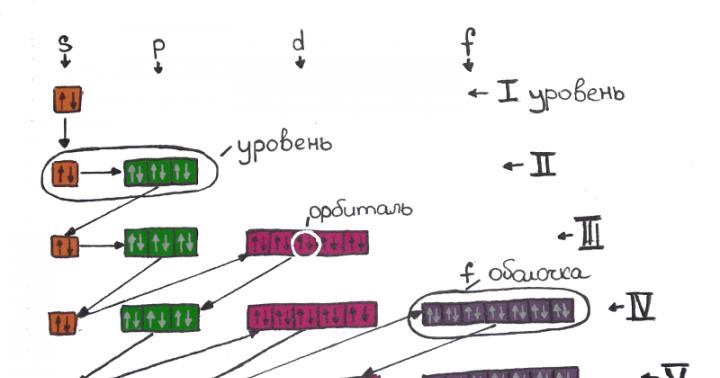DOB: 1925-06-26
Soviet pilot-cosmonaut, colonel, Hero of the Soviet Union
Version 1. What does the surname Belyaev mean?
Worldly name Belyai It was very common in ancient times. It could indicate a light complexion, hair, or mean “whitewashed,” that is, free from taxes.
Among the related “white” surnames are: Belov, Belyshev, Belyakov, Belyankin, Belyanchikov. However, it should be remembered that hare they also called a neat person, even if he had black hair, and whitefish- this is both a moth and a lupus fungus. Besides, Belyakov- it may be the same as Zaitsev- nicknamed "winter" white hare.
The Belyaevs are a noble family descended from Roman Afanasyevich Belyaev, who established the estate in 1633.
Belyaev Alexander Romanovich (1884-1942) - a wonderful science fiction writer, author of the novels “Amphibian Man”, “The Head of Professor Dowell”, “KETS Star”, etc.

DOB: 1884-03-16
Russian and Soviet science fiction writer
Version 2. History of the origin of the Belyaev surname
Originally a patronymic from a Russian non-church male name Belyai. In the past it was frequent. In Sl. Tupikov are cited from documents of 1422-1680. There are 33 examples of this name, which is a negligible part that has come down to us; Name Belyai could indicate a light complexion, hair, or have another meaning - “whitewashed,” i.e., free from taxes.
Version 4
All these surnames undoubtedly come from the nicknames of blond, white-faced people; In some places a neat person was also called a hare. Belyai is known as an ancient non-church; the name, even in this capacity, could break away from its common noun meaning. “Not everyone who bore the name Belyay was white, but Chernyai or Chernyshi were black,” notes linguist A. M. Selishchev. (F).
The appearance of I in the second position is typical for surnames of Polish origin: Bialkowski - Bialkowski. (U). BUT Bialko, Bialik are Ukrainian.
Belyaev. Originally a patronymic from the Russian non-church male name Belyay. In the past it was frequent. In Sl. Tupikov are cited from documents of 1422-1680. There are 33 examples of this name, which is a negligible part that has come down to us; the name Belyay could indicate a light complexion, hair, or have another meaning - ‘whitewashed’, i.e. free from taxes.
Belyakov (almost throughout the Arkhangelsk region). Possible etymological meanings of the bases: whitewashed, i.e. freed from taxes; in Vologda dialects belyak - 'shoes made of white rawhide', in the Kostroma region. - 'white-faced' or 'white-haired'. (H)
Version 5
The basis of the Belyaev surname was the secular name Belyai. The surname Belyaev goes back to the male non-church name Belyay, which was widespread in Rus' in the 15th-17th centuries. As a rule, it indicated a person’s appearance: “white” meaning “light, very pale, white-faced, blond.”
According to another version, the name Belyai can go back to the adjective “white” in the meaning of “dear, dear, good, pure, unsullied” - this is evidenced by many proverbs, for example: “The shirt is black, but the conscience is white.”
According to another hypothesis, Belyay could be a nickname assigned to a “whitewashed” peasant, that is, a peasant free from taxes. A peasant could become a white-haired free tiller for his services to the Tsar and the Fatherland, or taxes could be removed from him in exchange for another duty - military or monetary.
Finally, it is possible that the surname Belyaev could have been received by a person from the village or village of Belyaevo - there were quite a lot of villages with that name in Rus'.
The name Belyai and the surname Belyaev are mentioned in historical documents: Turin interpreter Belyai Ivanov, 1422; Mikhas Belyai, slave of the Gorodensky churchyard, 1500; Belyay Ivanov son of Korostelev, centurion in Smolensk district, 1609; townsman Belyai Pechonkin from Smolensk, 1609; slave Grisha Belyaev, 1608; peasant from Polotsk Voivodeship Belyai Mikhailovich, 1646. Among the famous representatives of the family is Alexander Romanovich Belyaev (1884-1942), Soviet science fiction writer, one of the founders of Russian science fiction literature.
Belyai is a non-canonical name common in Ancient Rus' (see: Tupikov, pp. 78-79; Veselovsky I).
A number of researchers connect the name or nickname Belyay (Belyayko, Belyayka; see: Chaikina. P.15) with the color of a person’s hair (Simina. P.28; Polyakova. P.30). However, according to the fair remark of V.A. Nikonov, “the name Belyay could indicate a light complexion, hair, or have another meaning - “whitewashed,” i.e. free from taxes” (Nikonov. P.18; this definition is literally reproduced verbatim in the book: Zhitnikov. P.70; Grushko, Medvedev. P.58). See also: BELOV, BELYKH, BILYAEV.
In the “List of 100” the surname ranks 46th.
Historical examples: “Grisha Belyaev, serf, 1608; Makar Belyaev, Chuguevite, boyar son, 1648" (Tupikov); “Bobyl of Orla-town Yakushko Ekimov son Belyayka, 1647; peasant of the village of Sludka on the Inva River Kirilko nicknamed. Belyayko, 1623; peasant of the village of Podvolochek on the Sylva river Maximko Artemyev son Belyaev, 1647” (Polyakova). In Vologda the surname has been documented since 1628 (Chaikina). The Belyaevs were among the backwaters of the Ayat region. (census of 1680; see also: Lyubimov. P.25,38, etc.); Tikhon Belyaev was in 1709 a clerk at the state-owned Alapaevsk plant (IU. P. 302,355). The surname is recorded in the North (Kargopol), in the Urals (Kishert, Kungur) and Trans-Urals (Zhitnikov. P.70).
In the Kataysky fort, the surname has been known since the 17th century: the white-local Cossack Vasily Yakovlevich Belyaev, originally from Tyumen, began his service around 1655 (census of 1695; see also: ZOLOTAREV); Mikhail Prokopyevich Belyaev, a peasant from the village of Martyusheva (5:2), originally from Kungur, from the village of Belyaeva, came to the Kataysky fort around 1679 (census of 1695; see also: Mankova. P.82); later his son Fyodor and brothers Fyodor, Ivan and Akakiy (Okatey) lived with him, and the latter two fled in 1707, as did another brother, Semyon, who lived separately (in 1706, together with his wife). Among them could be the ancestors of the Belyaevs from the southwestern parishes of Kamyshlovsky district.
At the beginning of the 18th century. the surname was found among peasants of different settlements: in the village of Verkhnyaya Aramylskaya (23:13) Lazar Ivanovich Belyaev lived on the farmstead with his brothers Arkhip and Varlam, in the village of Kurinskaya (36:1) - Vasily Anisimovich Belyaev, in the village of Krutikha (Beloyarskaya village .) - Nikifor Mikhailovich Belyaev, in the village of Bolshoy Fomina of the same settlement - Grigory Larionovich Belyaev (census of 1710), in the village of Borovoy (5:2) - Mikhail Prokopyevich (Prokofiev) Belyaev with his son Yevsey (census of 1719 ). Among the spreaders of factory work from Novopyshminskaya Sl. in 1729 there was a peasant Sergei Belyaev.
The ancestors of the Belyaevs in the Kamensky plant and neighboring parishes could have been peasants from the Kamenskaya village. Matvey Ivanovich Belyaev (died in 1730) and a peasant from the village of Shcherbakovskaya in the same settlement, Semyon Pavlovich Belyaev (died in 1742), with whom his son Ivan and stepson Vasily Grigorievich lived with their families (II revision, 1745).
In 1822 in Shcherbakovskaya village. the surname was borne by peasants and a soldier, in the village of Chetkarinsky - a soldier, in Novopyshminskaya village. - retired soldiers and peasants, in the Kamensky plant - artisans, in the villages - peasants.
The surname is common in Dalmatovsky (Memory - 18 people), Kamensky (Memory - 12 people), Sukholozhsky (Memory - 10 people) districts, found in Bogdanovichsky, Kamyshlovsky, Pyshminsky, Talitsky districts, in Yekaterinburg (Memory ; T 1974).
2 :1; 9 :5; 12 :1; 13 :5; 15 :4; 18 :1,10; 34 :2; 35 :1,2,4
2.1. Kamensky plant, parish of the Holy Trinity Church, founded in 1701; from 1935 - Kamensk (from 1940 - Kamensk-Uralsky)
9.5. Krasnoglazova village, parish of the Floro-Lavra Church, village of Barabanova (Krasnoglazova), 1869, from 1876 -
12.1. Shcherbakovskaya Sloboda, parish of the St. Nicholas Church, village of Nikolaevskoe Shcherbakovo (1719)
13.5. Glukhovskaya village, Ascension Church parish
15.4. Martynova village, parish of St. George's Church, village of Martynovskoye (1869), village of Martynova (no later than 1956)
18.1. Chetkarinskoye village, parish of the Baptist Church, Chetkarina village (1719), from 1766 - Chetkarinskoye village, Chotkarinskoye village (1923), Chetkarino (1928)
18.10. Borovlyanka village, parish of the Baptist Church
34.2. Valovaya village, parish of the Archangel Church, village Valovaya (1902)
35.1. Novopyshminskaya Sloboda, parish of St. Nicholas Church, (1689)
35.2. Zaimskaya village, parish of the St. Nicholas Church, also known as Patrakhova (1898)
35.4. Sergulovskaya village, parish of St. Nicholas Church, village of Sergulovka (Sergulova), 1869
The text is quoted from the book by Alexey Gennadievich Mosin “Dictionary of Ural Surnames”, publishing house “Ekaterinburg”, 2000. All copyrights reserved. When quoting the text and using it in publications, a link is required.
Friends, please click on the social media buttons, this will help the development of the project!
The owner of the surname Belyaeva can undoubtedly be proud of her ancestors, information about which is contained in various documents confirming the mark they left in the history of Russia.
Since ancient times, the Slavs had a tradition of giving a person a nickname in addition to the name he received at baptism. The fact is that there were relatively few church names, and they were often repeated.
A truly inexhaustible supply of nicknames made it easy to distinguish a person in society.
The sources could be: an indication of the profession, characteristics of the person’s character or appearance, the name of the nationality or locality from which the person came.
The surname Belyaev goes back to the nickname Belyai, which, in turn, had many interpretations. Firstly, this nickname was often given to a person with a light skin tone or blond hair.
However, another interpretation of the nickname is possible. “Not everyone who bore the name Belyay was white, but Chernyai or Chernyshi were black,” notes linguist A.M. Selishchev. In the old days, a very neat, always cleanly washed person was called white.
A similar nickname was often assigned to people leading a righteous lifestyle. Perhaps the owner of such a nickname could be representatives of the white clergy, that is, he belonged to the highest spiritual class.
In addition, the name Belyai could have another meaning - “whitewashed,” that is, “exempt from taxes.” For example, in medieval Rus', white settlements were cities that were freed from state taxes (that is, from taxes and duties to the state). Subsequently, the color white became a symbol of the monarchical idea in Russia.
In the past, the name Belyai was quite common. Tupikov's dictionary provides 33 examples of this name (surname) from documents of 1422-1680.
Already in the 15th-16th centuries, surnames began to be fixed and passed on from generation to generation, indicating a person’s belonging to a specific family. These were possessive adjectives with the suffixes -ov/-ev, -in, which initially indicated the father’s nickname.
The bulk of the population remained without surnames for a long time. The beginning of their consolidation was laid by the clergy, in particular, the Kiev Metropolitan Petro Mohyla, who in 1632 instructed the priests to keep the metrics of those born, married, and dead.
It is not possible at the moment to talk about the exact place and time of the appearance of the Belyaev surname, since the process of formation of surnames was quite long. Nevertheless, the Belyaev surname is a wonderful monument of Slavic writing and culture.
Sources: Dictionary of modern Russian surnames (Ganzhina I.M.), Encyclopedia of Russian surnames. Secrets of origin and meaning (Vedina T.F.), Russian surnames: popular etymological dictionary (Fedosyuk Yu.A.), Encyclopedia of Russian surnames (Khigir B.Yu.), Russian surnames (Unbegaun B.O.). Representatives of the family Belyaev included in the Genealogical books of the Noble Deputy Assembly:
- Vladimir province: in 1885 in the 2nd part (“Military nobility acquired by the rank of military service”), in 1817, 1893, 1899 in the 3rd part (“Bureaucratic nobility acquired by the rank of civil service or the award of an order”).
- Vologda province.
- Volyn province: in 1896 in the 2nd part (“Military nobility acquired by the rank of military service”), in 1903 in the 3rd part (“Bureaucratic nobility acquired by the rank of civil service or the award of an order”).
- Voronezh province.
- Ekaterinoslav province.
- Kazan province: in the 3rd part (“Bureaucratic nobility acquired by the rank of civil service or the award of an order”).
- Kaluga province: in 1815, 1832, 1863, 1882 in the 3rd part (“Bureaucratic nobility acquired by the rank of civil service or the award of an order”).
- Kyiv province: in 1844 in the 2nd part (“Military nobility acquired by the rank of military service”).
- Kostroma province: in the 3rd part (“Bureaucratic nobility acquired by the rank of civil service or the award of an order”).
- Kursk province: in the 3rd part (“Bureaucratic nobility acquired by the rank of civil service or the award of an order”).
- Minsk province: in 1847 in the 2nd part (“Military nobility acquired by the rank of military service”).
- Moscow province: in the 1st part (“Granted nobility and nobility up to a hundred years old”), in the 2nd part (“Military nobility acquired by the rank of military service”), in the 3rd part (“Bureaucratic nobility acquired by the rank of civil service or the award of an order").
- Nizhny Novgorod province: in 1862 in the 3rd part (“Bureaucratic nobility acquired by the rank of civil service or the award of an order”).
- Novgorod province: in 1860 in the 2nd part (“Military nobility acquired by the rank of military service”), in 1827, 1830, 1847, 1860, 1861 in the 3rd part (“Bureaucratic nobility acquired by the rank of civil service or award orders").
- Regions of the Don Army (Don Region).
- Olonets province: in 1847 in the 3rd part (“Bureaucratic nobility acquired by the rank of civil service or the award of an order”).
- Orenburg province.
- Oryol province.
- Penza province: in 1810, 1840 in the 3rd part (“Bureaucratic nobility acquired by the rank of civil service or the award of an order”).
- Podolsk province: in 1851 in the 2nd part (“Military nobility acquired by the rank of military service”).
- Pskov province: in 1847 in the 3rd part (“Bureaucratic nobility acquired by the rank of civil service or the award of an order”).
- Ryazan province: in 1846, 1889, 1896 in the 3rd part (“Bureacratic nobility acquired by the rank of civil service or the award of an order”), in 1794 in the 6th part (“Ancient noble noble families, proof of noble dignity, which go back 100 years, that is, before the reign of Emperor Peter I").
- St. Petersburg province: in 1816 in the 1st part (“Nobility granted and nobility up to a hundred years old”), in 1846, 1863 in the 2nd part (“Military nobility acquired by the rank of military service”), in 1816, 1844, 1849 in the 3rd part (“Bureaucratic nobility, acquired by the rank of civil service or the award of an order”), in 1817 in the 6th part (“Ancient noble noble families, proof of noble dignity, which go back over 100 years, then exists until the reign of Emperor Peter I").
- Saratov province: in the 2nd part (“Military nobility acquired by the rank of military service”).
- Simbirsk province: in 1792 in the 6th part (“Ancient noble noble families, proof of noble dignity, which go back 100 years, that is, before the reign of Emperor Peter I”).
- Tambov province.
- Tver province: in 1851 in the 3rd part (“Bureaucratic nobility acquired by the rank of civil service or the award of an order”).
- Tula province: in 1802 in the 1st part (“Granted nobility and nobility under one hundred years of age”), in 1882 in the 3rd part (“Bureaucratic nobility acquired by the rank of civil service or the award of an order”), in 1793, 1795 years in the 6th part (“Ancient noble noble families, proof of noble dignity, which go back 100 years, that is, before the reign of Emperor Peter I”).
- Kharkov province: in 1899 in the 3rd part (“Bureaucratic nobility acquired by the rank of civil service or the award of an order”).
- Kherson province.
- Yaroslavl province.


